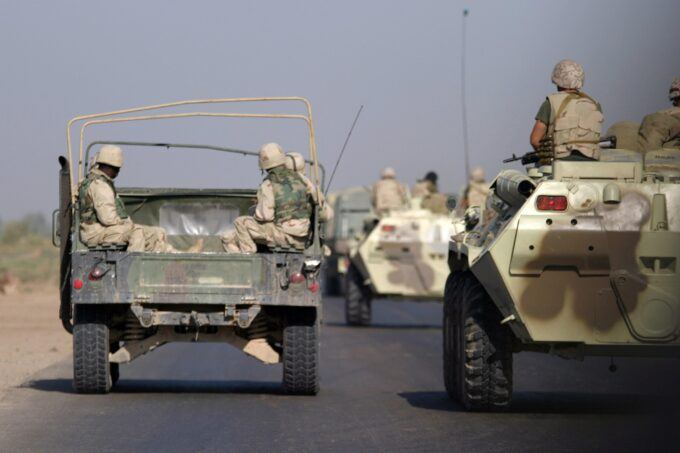
Photograph Source: Andrew Williams – Public Domain
Back in 2015, when I was driving from Kuopio Finland up to the country’s far north to write an article on global warming and how it was affecting the Sami indigenous people of Lappland, I found myself offering rides to a number of Ukrainian young people, mostly male, or males accompanied by girlfriends, who were fleeing the civil war in their country, which saw Ukrainian forces, including the fascist Azov Battalion, shelling and shooting at ethnic Russians in the two breakaway oblasts of Donetsk and Lugansk.
These young people of draft age all told me they were fleeing their country to avoid being drafted to fight in a war against their countrymen in eastern Ukraine, a majority Russian region of Ukraine. “I have nothing against those people in Donbas,” one young man told me, “and I don’t want to be forced to kill them and get killed myself.”
They had all gone to Finland because of short-term agricultural work visas available to people willing to pick blueberries, which cover the forest floor above the Arctic Circle at that time of summer.
I appreciated their dilemma. Back in the Spring of 1967 I and many young men like me of draft age were faced with a draft at a time that the US was ramping up a war against Vietnam and forces in that country that were fighting for its liberation from a century or more of colonial and imperial subjugation and for unification after the US had blocked a unification election fearing it would result in a victory by national hero and Communist Party leader Ho Chi Minh.
I didn’t want to support the US war, or any war. My options were leaving for Canada, as some of my school classmates did, hiding out and dodging the draft and the FBI, which others did, or resisting the draft and refusing to be inducted, which would likely mean federal prison, as others did. I knew I would not participate in the war in Indochina in any capacity, even doing “alternative service.” With a low draft lottery number (81) assuring I would get a call to be inducted into the army, I chose resistance.
But I didn’t pass judgment on what choices other young men made. Anyone who took steps to avoid being made part of the US war machine was doing the right thing in my view.
Now in Ukraine men of all ages between 18 and 60 are required to take up arms and defend their country from a Russian invasion. Some may say that it is a struggle for the independence of Ukraine, but the issues are more complex than that. Ukraine has not been innocent in the conflict with its larger neighbor Consider for example the laws passed since the 2014 US-backed Maidan Coup that overthrew Ukraine’s elected government and president — laws barring the Russian language in schools, and punishing and threatening ethnic Russians and also the violent attacks on the two oblasts of Donetsk and Lugansk, in violation of n agreement reached in Minsk that granted them autonomy.
As well, regardless of the causes of this current war in Ukraine, many people simply do not believe war is the answer. As one young draft dodger who fled Kiev and slipped out of war-torn Ukraine making his way to the UK told the New York Times, “Violence is not my weapon.” He reports getting death threats from people in Ukraine.
It was, actually, a bit like that in the us back in the late ’60s and early ’70s. Being even suspected of being or looking like the popular image of a “draft resister” could lead to one’s being called a traitor, being beaten up, or having one’s hair or beard cut off. I remember getting a few death threats back in those days for articles I wrote against the draft and against the US war on Vietnam, Laos and Cambodia.
So I want to say clearly that I heartily support those men of draft age in Ukraine who refuse to support the war by picking up one of the guns being handed out by the Ukraine government, and who flee the country to escape being made to fight something they don’t believe in — reportedly as many as 15,000 to date. I also heartily support those courageous protesters, tens of thousands of them, who are protesting Russia’s invasion of Ukraine, some of whom are facing stiff prison terms for their actions.
But nobody is calling Russia a free country. Ukraine is a different matter though, at least in the US media.
A free country is one that respects freedom of conscience. It is also one that allows freedom of travel. Ukraine’s government under the vastly over-praised western media darling of the moment, President Volodomyr Zelenskyy, has violated those freedoms by barring exit from the country to men of fighting age who don’t believe in this war, don’t want to fight in it, and don’t want to die for their country..
That action of a compulsory draft and a closed border to adult males should disqualify Zelenskyy from talking about freedom, and gives the lie to those in the US who describe Ukraine’s fight against Russia as being part of a struggle between dictatorship and some supposedly ‘free world.”
In January 1977, President Jimmy Carter (a US Navy officer and veteran), granted a blanket to draft dodgers, resisters and those who had fled the country. It was a presidential recognition that opposition to the draft was an act of conscience, not crime.